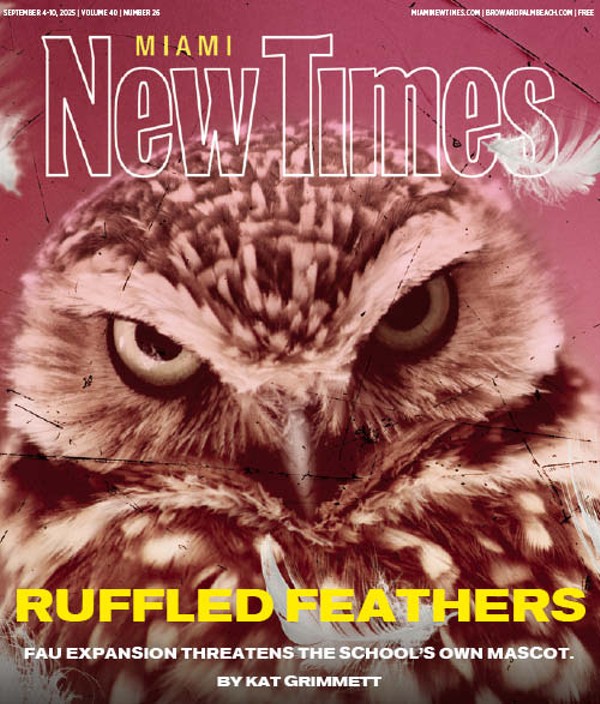People & Places
Flagler Street from Twelfth Avenue to Biscayne Bay
Flagler Street from Twelfth Avenue to Biscayne Bay
Kitsch tour of South Dade
Coral Castle
Olympia Theater
Gusman Center for the Performing Arts
Pat Tornillo
Pat Tornillo
The Raul Martinez political machine versus the Hialeah Three
The Raul Martinez political machine versus the Hialeah Three
Intersection of Coral Reef Drive, SW 117th Avenue, and Florida Turnpike
Intersection of Coral Reef Drive, SW 117th Avenue, and Florida Turnpike
Enrique Santos and Joe Ferrero
Masters of forms undefined,
Divine and unmatched.
North Miami Avenue between 20th and 36th streets
North Miami Avenue between 20th and 36th streets
George Sanchez Calderon's
Midnight Midtown Midway during Art Basel
George Sanchez Calderon's
Midnight Midtown Midway during Art Basel
Stephen P. Clark Government Center courtyard
Stephen P. Clark Government Center courtyard
New regime at Miami's Community Redevelopment Agency
New regime at Miami's Community Redevelopment Agency
Walgreens at the historic Firestone building
Walgreens at the historic Firestone building
Surfing South Beach
Thursday-night faith healing
Bible Way Prayer Mission
Thursday-night faith healing
Bible Way Prayer Mission
Willie and Sal trial jurors
Willie and Sal trial jurors
Miami-Dade County Cable Television Access Project
Official Latin Grammys afterparty
September 3, 2003
Official Latin Grammys afterparty
September 3, 2003
Best Local Landmark
DinnerKey
It got its name in the Thirties when people began bringing box dinners there to watch the seaplanes fly in and out. The current Miami City Commission building was the old Pan American seaplane terminal. It really helped Miami secure its place in aviation and as a gateway to the islands and South America.
Best Sanctuary From the Fast Track
Well, my track isn't really all that fast, but when I want to completely unplug, I head to Miami Beach. I've got beach in my blood. I really enjoy sitting on the sand, butchering Elvis Costello or They Might Be Giants songs on my acoustic. We tend to take the beach for granted here. Usually we park ourselves just north of the Eden Roc. We've tried the beaches down by South Beach, but I personally exceed the maximum body fat requirement necessary to go south of Fifth Street.
Best Month
August
Okay, this is the one where everyone will think I'm crazy, but I LOVE August. Everyone and their grandmother is out of town; the beaches, stores, and restaurants are hassle-free; golf courses are cheap; you can tell who the REAL Marlins fans are; and people are just too hot and tired to be rude.
Best Not-So-Cheap Thrill
Quick seating at Joe's
I know, it's shallow and petty, but we're talking culinary institution here. I've been fostering a relationship with Dennis and Anthony for years. There is a guilty pleasure in walking past the mob scene and getting a table (don't hate the player, hate the game). Cliché or not, Joe's Stone Crab is one of the finest meals to be had in this town. I think one of the street tests of power in this town is how fast you can get a table at Joe's. I'm far from being one of those waltz-in guys, but each season gets better.
Best Cheap Thrill
Catching a set of the Spam Allstars around town is always fun. Free at Jazid on Wednesday nights, cheap at I/O on Thursdays. Another great cheap thrill is the Gulfstream Park concert series. For five bucks, you can catch the "They're still around?" band circuit. Very high camp factor.
Best Reason to Live in Miami
I think it has to be the pace of this place. Miami is a mile-a-minute living theater. Just when you think that things are settling down, something inevitably happens to push the limits. Whether it's Elian, a Haitian freighter, the Miami Circle, public corruption, a botched election, you name it, there is always something that makes us take a step back, but then usually leads to three steps forward.
Kaplan can actually discuss almost any subject with verve, wit, and an infomaniac's breadth of perspective, and becomes confounded only by superlatives to use regarding his beloved Florida Marlins. Kaplan was there for the first pitch of the very first game back in 1993, and continues to follow the Fish through ticker-tape parades and annoying personnel dramas.
Though the county's elections department has moved from downtown Miami to Doral, where, Kaplan says, he sometimes takes his life in his hands to cross eight lanes of traffic for some Dunkin' Donuts, he is especially beloved by the staff of this newspaper for his years of public-transportation patronage.
Best Sanctuary From the Fast Track
The parks of Key Biscayne
Bill Baggs State Park and Crandon Park -- because I can bike there from where I live. With our geography, you can see a great sunrise from plenty of places in Miami-Dade. Baggs is one of a smaller number of places where you can watch a great sunset. And considering how close you are to downtown, you feel remarkably far away.
Best Month
December
That's when most people in this country are beginning to face several months of living indoors, while things are just getting good in Miami.
Best Not-So-Cheap Thrill
Great seats at a Marlins game
Aside from mountains, Major League Baseball was once one of the only things missing in Miami. For a fan like me, just getting the team was great. The championship in 1997 was even better. But now ... I mean, this is the most exciting -- and most genuine -- thing I've ever seen in professional sports. In an era when too many athletes bring shame to their teams and sports, we have a team about whom we can tell little kids: "Watch how these guys play. Listen to the things they say." And there's nothing like watching it all up close.
Best Cheap Thrill
Riding the public bus
Yes, I know, it's supposed to be just a way to get around town. But sometimes, you get a lot more than that. I recently purchased a car after the Elections Department moved out west from downtown, but I had spent the previous three years without a car, relying almost exclusively on public transportation. I could -- and should -- write a book about my experiences. I did a lot of reading while someone else was driving the bus -- this limousine for the masses -- but sometimes I would just look out the window and take in the flavor of the Miami-Dade neighborhoods that so many folks never see while they're bypassing it all on the highway. Yes, the places I saw were interesting, but the people were the best part. Here I am, getting my heart warmed and feeling better about humanity, all for $1.25, while everyone else is cutting each other off and honking at each other in their cars outside.
Best Reason to Live in Miami
It's the same reason as the worst reason to live in Miami: the craziness. I know there are cleaner cities and wealthier cities, cities with healthier economies and better job markets.... But there aren't many more interesting cities -- cities with more character and characters -- than Miami.
Kaplan can actually discuss almost any subject with verve, wit, and an infomaniac's breadth of perspective, and becomes confounded only by superlatives to use regarding his beloved Florida Marlins. Kaplan was there for the first pitch of the very first game back in 1993, and continues to follow the Fish through ticker-tape parades and annoying personnel dramas.
Though the county's elections department has moved from downtown Miami to Doral, where, Kaplan says, he sometimes takes his life in his hands to cross eight lanes of traffic for some Dunkin' Donuts, he is especially beloved by the staff of this newspaper for his years of public-transportation patronage.
Best Sanctuary From the Fast Track
The parks of Key Biscayne
Bill Baggs State Park and Crandon Park -- because I can bike there from where I live. With our geography, you can see a great sunrise from plenty of places in Miami-Dade. Baggs is one of a smaller number of places where you can watch a great sunset. And considering how close you are to downtown, you feel remarkably far away.
Best Month
December
That's when most people in this country are beginning to face several months of living indoors, while things are just getting good in Miami.
Best Not-So-Cheap Thrill
Great seats at a Marlins game
Aside from mountains, Major League Baseball was once one of the only things missing in Miami. For a fan like me, just getting the team was great. The championship in 1997 was even better. But now ... I mean, this is the most exciting -- and most genuine -- thing I've ever seen in professional sports. In an era when too many athletes bring shame to their teams and sports, we have a team about whom we can tell little kids: "Watch how these guys play. Listen to the things they say." And there's nothing like watching it all up close.
Best Cheap Thrill
Riding the public bus
Yes, I know, it's supposed to be just a way to get around town. But sometimes, you get a lot more than that. I recently purchased a car after the Elections Department moved out west from downtown, but I had spent the previous three years without a car, relying almost exclusively on public transportation. I could -- and should -- write a book about my experiences. I did a lot of reading while someone else was driving the bus -- this limousine for the masses -- but sometimes I would just look out the window and take in the flavor of the Miami-Dade neighborhoods that so many folks never see while they're bypassing it all on the highway. Yes, the places I saw were interesting, but the people were the best part. Here I am, getting my heart warmed and feeling better about humanity, all for $1.25, while everyone else is cutting each other off and honking at each other in their cars outside.
Best Reason to Live in Miami
It's the same reason as the worst reason to live in Miami: the craziness. I know there are cleaner cities and wealthier cities, cities with healthier economies and better job markets.... But there aren't many more interesting cities -- cities with more character and characters -- than Miami.



